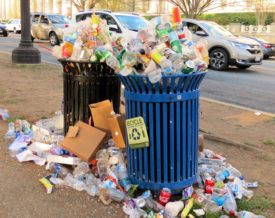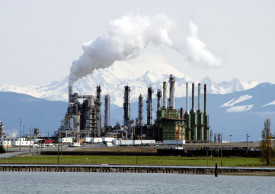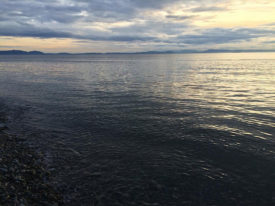 The long term outlook for Puget Sound’s resident orcas depends in part on the health of the Columbia Chinook salmon, which are themselves struggling because of the four dams on the Lower Snake River. In a word: To save the whales, we may need to first save the salmon. Saving the salmon may mean tearing out the dams. And tearing out the dams would mean bridging a nasty political divide in the Northwest.
The long term outlook for Puget Sound’s resident orcas depends in part on the health of the Columbia Chinook salmon, which are themselves struggling because of the four dams on the Lower Snake River. In a word: To save the whales, we may need to first save the salmon. Saving the salmon may mean tearing out the dams. And tearing out the dams would mean bridging a nasty political divide in the Northwest.
Few issues in regional conservation raise tensions faster than talk of breaching those dams. But if we are to protect the Sound’s orcas, the subject will have to be revisited. Again. And writer David Neiwert does so in an exceptionally nuanced article in the Seattle Weekly. He points out, rightly, that we simply don’t know as much as we should about the resident orcas, especially about their wintertime travels and diet. We need more scientific research in a hurry. And if the best evidence is right—that Columbia Chinook are a necessary component of orca recovery—we’ll also need some skillful politicking because either the whales will continue to face insufficient food or the dams will have to come down. As Neiwert casts the issue, we’ll have to bridge the cultural and political divide between Puget Sound urbanites, who love the whales, and rural inland northwesterners who want the dams in place.
It’s tragic, in a sense, that the fate of the orcas may rest on political machinations. The southern resident orcas, perhaps even more than the salmon, are an emblem of the ways that ecosystems and wild creatures are not just local phenomena. They rely on the integrity of whole landscapes with all their biological complexity, even though those landscapes are sometimes overlaid by a fragmented and poisonous political system.
At the very end of the article, Neiwert touches on what I think may be the key. The policies to protect orcas—cleaning up toxics, easing sprawl, restoring fisheries—have other effects too. Namely, they’re pretty good for people. So in the face of staunch political opposition, maybe it’s time for conservationists to try another tactic: showing that the policies in the best interest of orcas are also in the best interest of people.
If that sounds woefully anthropocentric to you, well, I agree that it is. But consider why the orcas get so much attention: it’s at least in part because they exhibit signs of intelligence, even appearing to mimic certain human behaviors such as family life. The Western Grebes and geoducks of Puget Sound are struggling too, but they don’t get nearly the conservation resources because they’re simply not as charismatic. We’re eager to protect the orcas at least in part because they remind us of ourselves.
Whether or not that’s a bad thing is a subject for another (and longer) post, but it’s useful to remember that, in a metaphysical sense, protecting the orcas is also partly about protecting ourselves. And in a practical sense, we inhabit the very same ecosystems as the orcas. So a Northwest with natural systems resilient enough to support a flourishing orca population is likely to be one that supports a flourishing human population too.
At the very end of the article, Neiwert touches on what I think may be the key. The policies to protect orcas—cleaning up toxics, easing sprawl, restoring fisheries—have other effects too. Namely, they’re pretty good for people. So in the face of staunch political opposition, maybe it’s time for conservationists to try another tactic: showing that the policies in the best interest of orcas are also in the best interest of people.
If that sounds woefully anthropocentric to you, well, I agree that it is. But consider why the orcas get so much attention: it’s at least in part because they exhibit signs of intelligence, even appearing to mimic certain human behaviors such as family life. The Western Grebes and geoducks of Puget Sound are struggling too, but they don’t get nearly the conservation resources because they’re simply not as charismatic. We’re eager to protect the orcas at least in part because they remind us of ourselves.
Whether or not that’s a bad thing is a subject for another (and longer) post, but it’s useful to remember that, in a metaphysical sense, protecting the orcas is also partly about protecting ourselves. And in a practical sense, we inhabit the very same ecosystems as the orcas. So a Northwest with natural systems resilient enough to support a flourishing orca population is likely to be one that supports a flourishing human population too.







